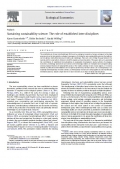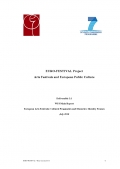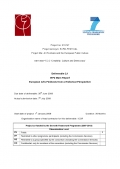Uploaded by Ivan Montenegro Perini 5345 days ago Number of pages: 141 File's language: English Views: 2274
The sociological study of culture – whatever its definition and delimitation – is enjoying an increased impetus in recent years, expanding its fields of enquiry and methods, and in general being recognised as a key branch within sociology and as a main bridge towards other cognate disciplines. This has opened many new opportunities to study cultural phenomena with a view that their interpretation is relevant both in itself and as an insight into wider issues, especially among those dominating the scene of recent social theory and research. It is one of such opportunities that the partners of the EURO-Festival project meant to grasp in identifying a thus far virtually unexplored area of research that examines the role of festivals as sites of trans-national identification and democratic debate, thereby aspiring to contribute to the comparative cultural sociology of contemporary European society.
Resulting from the combination of the long-standing research interests of the partners, the project has taken shape in response to a call within the EU‟s 7th RTD Framework Programme (7FP) that recognised the need for research investigating the role of creativity and of artistic endeavours for issues of public relevance and for „democracy‟ in particular (task 5.2.2 of the Social Sciences and Humanities Programme). This promoted possibilities for research that, especially within a collaborative project allowing for comparative relevance, is still scarce. Taking festivals as a context of research – following related expertise on festivals and cultural events more generally of many of the involved scientists (see for instance Chalcraft, 2007; Magaudda, 2008; Santoro, 2006; Sassatelli, 2008; Segal, 2007) – we reunited the group around a cluster of key research questions that linked festivals to the current debate on the post-national transformations of identities and cultural contexts, a debate that again saw many of the research partners actively engaged in, especially with regard to issues of public sphere, European identity and cosmopolitanism (Giorgi et al. 2006, Delanty, 2005; Delanty and Rumford 2005; Sassatelli, 2002).
The broad leading questions that consolidated as the project took shape addressed the relation between democratic debate and cultural creativity/production, in particular with regard to how festivals as sites of public culture may give expression to democratic debate and transnational identifications, and, therefore, what they can tell us about European culture and identity. The approach adopted is to develop a cultural sociology of festivals through case studies of selected major European festivals with a view to gaining an understanding of their role in the construction of a new European public sphere, in this case an aesthetic public sphere, related to the trans-national, cosmopolitan character of these festivals. This crystallised in the following research objectives:
- Explore how festivals use aesthetic forms to symbolize, represent and communicate social and political life (European / national / sub-national) from the perspective of different actors, including programme directors, funding promoters, performing artists and the audience.
- Study the way in which festivals frame the discourse of identity in relation to arts with particular attention to the local / European and local / global interfaces as well as the conundrum of difference (diversity) and similarity.
- Analyze how festivals represent sites of competition for access to resources, status and power and how this competition impacts on debates about representation, openness and the public sphere.
Given the project‟s objectives and multidisciplinary approach, this has meant first of all bringing together different theoretical traditions in the social sciences (sociology in particular) and humanities, so as to capture the equally multifaceted nature of festivals. Naturally, the choice of art festivals meant that the sociologies of art (literature, music, etc.) have all been relevant, as well as more generally the sociological study of culture as such. To this, our interest in exploring the link of these with a developing European public culture has also meant a consideration of the literature on the public sphere, cosmopolitanism, European identity and society (both in a comparative perspective and as new emerging phenomena on their own). Also urban theory and more generally urban studies had to be included, considering the centrality of urban culture and development both for interpreting the recent impulse of festivals across Europe, and for issues of cosmopolitanism, public sphere, etc. It is both the specification of object of inquiry (festivals) – and thematic target (transnational identities, new cultural dispositions and how they both find expression in and give form to democratic debate) that holds together and helps in finding a transversal reading of such a vast host of sources.
Comments (1)
 Youth, Unemployment, and Exclusion in Europe: A Multidimensional Approach to Understanding the Conditions and Prospects for Social and Political Integration of Young Unemployed
Youth, Unemployment, and Exclusion in Europe: A Multidimensional Approach to Understanding the Conditions and Prospects for Social and Political Integration of Young Unemployed Climate change, hydro-conflicts and human security: Achievements of and Gaps in current policies
Climate change, hydro-conflicts and human security: Achievements of and Gaps in current policies Sustaining sustainability science: The role of established inter-disciplines
Sustaining sustainability science: The role of established inter-disciplines European Arts Festivals: Cultural Pragmatics and Discursive Identity Frames
European Arts Festivals: Cultural Pragmatics and Discursive Identity Frames European Arts Festivals from a Historical Perspective
European Arts Festivals from a Historical Perspective European Public Culture and Aesthetic Cosmopolitanism
European Public Culture and Aesthetic Cosmopolitanism
iKNOW has been featured in the media and several research projects:
DIE ZEIT (Germany), Financial Times (Germany), El Heraldo (Colombia), Prospective Foresight Network (France), Nationalencyklopedin (Sweden), EFP - European Foresight Platform (EC), EULAKS - European Union & Latin America Knowledge Society (EC), CfWI - Centre for Workforce Intellience (UK), INFU - Innovation Futures (EC), Towards A Future Internet (EC), dstl - Defence S&T Laboratory (UK), EFSA - European Food Safety Agency (EU), Malaysia Foresight Programme (Malaysia), Bulletins Electroniques more...

Generally, the festivals and art representations are neglected by the majority of social sciences such as Sociology, Economy, Politic Science, so on. However, Anthropology have taken into account them because their scholars consider that in these representations is possible to find the depictions of social life such as politic, economic and social issues. In addition, it is preponderant to bear in mind that in the festivals are given ways of debate which are essential features of democracy; the festivals represent sites of competition for access to resources, status and power, and they are spaces of concentrated debate and social effervescence